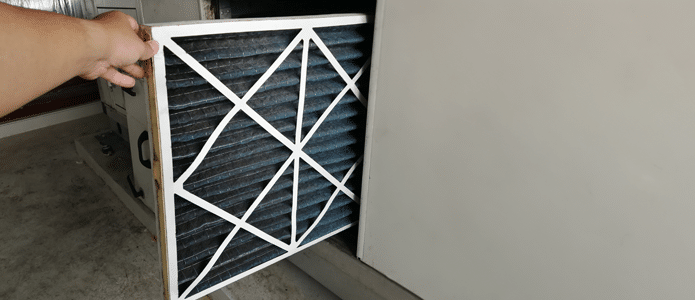
A common mistake homeowners make is not regularly swapping out their air filters. Dirty filters not only make your equipment work harder but also diminish indoor air quality. A general rule is to replace filters at least every three months. However, each home is unique, so we recommend a visual inspection each month and changing them out whenever you see an accumulation of dust.
HVAC filters trap dust, pollen, pet dander, and other small particles to prevent them from being recirculated throughout your home. A higher MERV (Minimum Efficiency Reporting Value) rating indicates a more effective filter. Additionally, filters protect your HVAC system from larger particles that could damage it. It is important to use the right type of filter and change it regularly.
Here are the different types of filters available for residential HVAC systems:
These are disposable and the least expensive option. They cause less strain on HVAC systems when drawing in air and keep large particles out of your system. However, they are not very effective at trapping dust and smaller contaminant particles. These filters typically have a MERV 4 rating and may not be suitable for those with allergies or respiratory problems.
Made of cotton or polyester folds, these filters are slightly more expensive than fiberglass filters but more effective at filtering dust, pollen, mold spores, and pet dander. Filters with more pleats provide better filtering and prevent dust and other particles from being recirculated in the air. These filters typically have MERV ratings between 5 to 8.
Recommended for individuals with allergies or respiratory problems, these filters can screen up to 99.97% of dust, pollen, mold, pet dander, viruses, bacteria, and other irritants. Look for filters with a MERV 11 or higher rating. However, a higher MERV rating means your HVAC system has to work harder to pull in air, so check with us to determine the best MERV rating for your system.
Used in air cleaners built into your HVAC system, these filters use ultraviolet light to kill viruses, bacteria, and other microorganisms in the air. However, they are not very efficient at removing dust and other contaminants. They are suitable for those concerned about indoor air quality, that an air cleaner can address.
MERV stands for “Minimum Efficiency Reporting Value.” While the air filter controls the amount of unwanted air particles entering your home, the MERV rating shows you which filter is the best fit for your home. The higher the MERV rating, the fewer particles and contaminants will be allowed into your home. However, the highest MERV ratings, while most effective for air quality, can harm your HVAC system.
A higher MERV rating means higher resistance, which means less airflow. Restricted airflow makes your furnace overwork itself, potentially leading to damage. Additionally, you may not get the air velocity required to reach all parts of your home, leaving inconsistencies in temperature.
MERV 11: Superior particulate removal, system protection, and static pressure compared to 1″ filters. Vacuum and dust less often. Up to 1-year filter life.
MERV 13: Designed for homeowners with low-to-moderate allergy problems. Low resistance. Up to 1-year filter life.
MERV 13 + Odor Reduction: Most activated carbon added to any air filter. Reduces noticeable odors caused by pets, cooking, and common household VOCs. Superior system protection. Up to 6-month filter life.
MERV 16: Low resistance. Removes up to 99% of allergy & asthma triggers. Superior system protection. Up to 6-month filter life.
A MERV rating of 13-16 is considered hospital-level air quality, so it is unlikely your home needs any more than that. According to the United States Environmental Protection Agency, filters from the 7-13 range often have little difference from the higher MERV ratings but will allow your system to run much more efficiently.
Choosing between MERV 7 and 13 depends on your filtration needs. If your family has allergies or asthma, a higher MERV rating will benefit you. If not, a lower filter like a 7 will save you money on your energy bill.
Remember to replace your filter according to its recommendations. Otherwise, it gathers dirt and dust, making it more restrictive and less effective at filtering. If you have any questions about your specific home, feel free to ask an Air Professionals Heating & Air Conditing.
Choose the Right Filter for Your Home Selecting the right filter is crucial for maintaining a healthy indoor environment and protecting your HVAC system. If you need assistance in choosing the right filter or have questions about your HVAC system, contact us at Air Professionals Heating & Air Conditing. We are here to help ensure your home stays comfortable and healthy all year round.
© Air Professionals LLC [#this year :%Y]. All rights reserved.